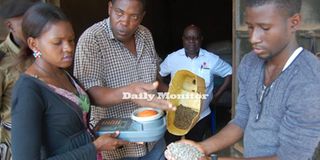UCDA moves to check harvest of immature coffee

Fidel Bukomaze, UCDA quality control officer, explains the use of a moisture meter at a factory in Bukomansimbi District. PHOTO BY FRED MUZAALE
Uganda Coffee Development Authority (UCDA) has intensified its campaigns to stop farmers and traders from harvesting and trading in immature coffee.
In one month, more than 70 coffee factories have been closed and 20 farmers arrested in central and eastern parts of the country.
Edmond Kananura, the head of quality, UCDA, says the taskforce aims to curb the continuous inflow of wet coffee in Kampala.
“We are receiving cases of wet coffee at grading factories in Kampala. So far, many have been netted but this alone can’t help,” he explains. “So, we decided to roll out campaigns in the areas where the adulteration takes place first.”
The regulations state that coffee should be dried to a moisture rate of 13–14 per cent.
Kananura adds that harvesting immature coffee has dire effects on the coffee cup in the long run. “The coffee may be good in appearance but not appealing in the cup. A good cup is what sells coffee and these attributes are absent if the coffee was hulled when it is not dry. The quality of the cup subsequently affects the market.”
Meet regulations
Thus, farmers should also dry coffee on tarpaulins, and should not keep coffee in stores with improper aeration. The factories should be in good hygienic conditions and all those trading in coffee must possess a trading license..
Elias Ayiga, a technical officer at UCDA, says the factories that were closed will remain so till they have satisfied the conditions.
“Coffee is food so it has to be processed in hygienic conditions. A coffee factory must have cemented floors, plastered walls and a husking chamber,” he pointed out. “When the owners of the closed factories work on these requirements, we shall clear them to do business.”
He added that the police is now equipped with the necessary information about coffee and is in a position to enforce the law in the absence of UCDA officials.
“Police stations have officers attached to the agricultural police. These will see to it that all those arrested are charged and presented in the courts of law.”
Last year UCDA enforced a ban on coffee processing in Busoga till the start of the season. According to Fredrick Sewaya, head of the region, this would be the only option if farmers and traders fail to comply with the regulations.
Lutakome Ssentamu, the manager central region, revealed that several replanting campaigns have been embarked on with the aim of increasing the country’s coffee volumes. However, these efforts have been stifled by poor post-harvest handling methods.
“We are have been carrying out replanting since 1998 after we lost half of the robusta trees due to the coffee wilt disease,” he said.
“We seem to have now improved on the volumes but the quality is still low and these two move in tandem.”
But not all is lost. Uganda is now the leading coffee exporter in Africa with more than two million 60kg-bags annually. And UCDA is optimistic that these figures are projected to increase over the next few years.




